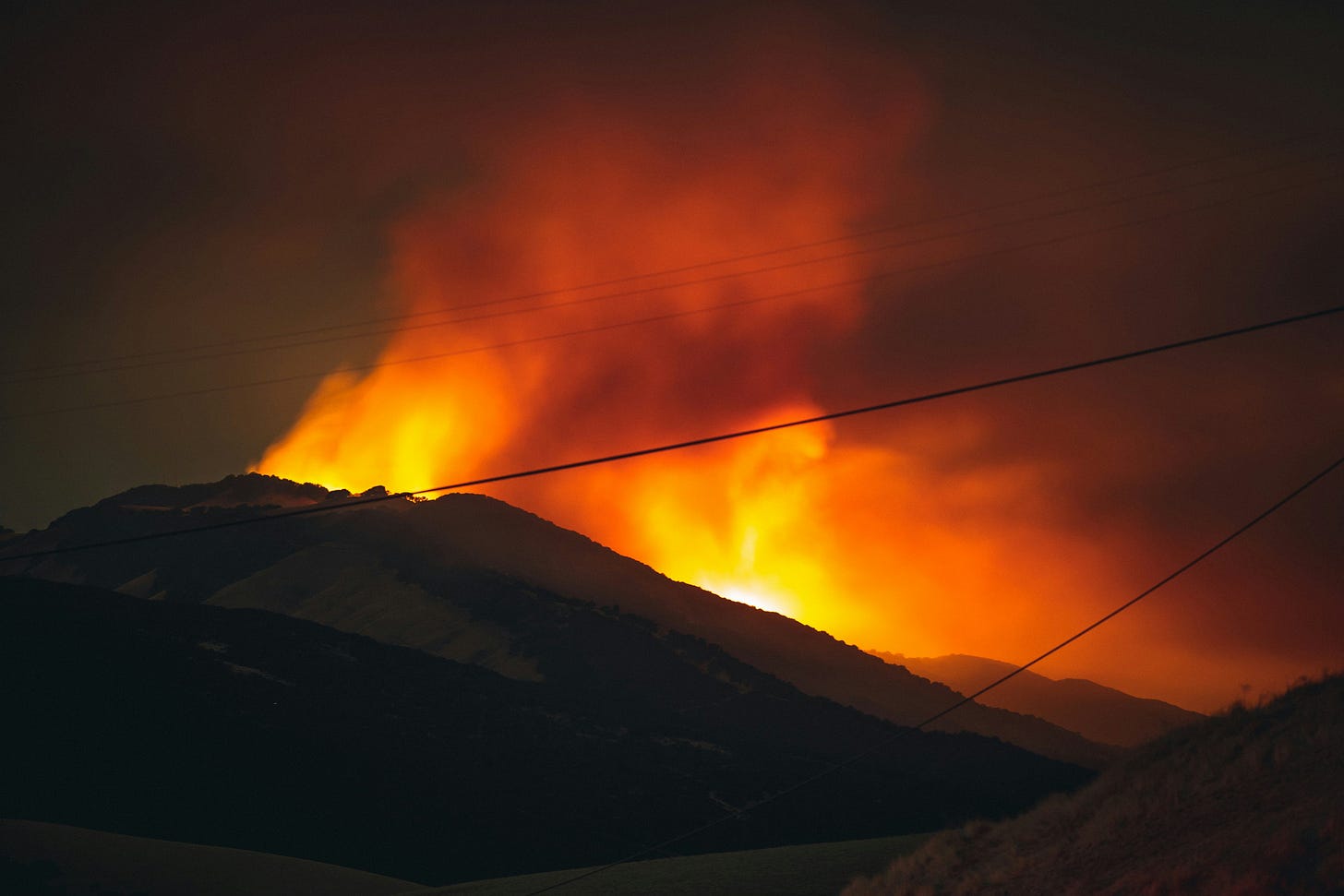Los Angeles fires are climate breakdown in real time
Climate breakdown refers to the proliferating costs, disruptions, losses, and eventual erosion of resources to sustain everyday security and wellbeing. Science shows early action is needed to stop it.
The planet never stops spinning. The climate never sleeps. By their nature, climate disruption and the wider planetary crisis are 24/7/365 problems. To those who worry they “hear too much” about an issue they think is someone else’s business: Unless you are hearing about climate change or planetary crisis 24/7/365, with detail about effects and ramifications in many regions and local conditions, you are not getting the whole story.
That doesn't mean you need to focus on or read nothing except climate-related news. It just means understanding the primacy of the climate challenge and its impact in all areas of life starts with understanding that it will always be bigger and more nonstop than any of us would like.
The Los Angeles fires have many asking why it isn’t easier to contain them. Why doesn’t the will to fight the fires translate into success, given all the experience and resources that can be brought to the fight? To really understand the problem of megascale firestorms fueled by climate change, the book Fire Weather by John Vaillant is an excellent, haunting deep dive into the problem.

Conditions in the region around Los Angeles right now are as fire-conducive as any human beings can experience. Beyond that, municipal fire departments are not designed to combat region-wide firestorms. Many of the tools used to fight wildfires, including “water bomber” aircraft, are simply too small a response for something on the scale of the fires that are emerging now, as fire seasons become a year-round threat of total devastation and megascale firestorms create their own weather, which helps them to spread.
The Fort McMurray fire recounted in dramatic, intimate, and scientific detail in Fire Weather released the energy equivalent of multiple Hiroshima bombs per minute. Such analysis is not yet publicly available for the Los Angeles fires, but they present a similar challenge. Extreme conditions of dryness and two major wind conditions mean the firestorms affecting the Los Angeles region right now are functioning at a completely different magnitude than human fire containment capabilities. While firefighters risk their lives and use all available tools and strategies to limit the spread of these firestorms, the fires are, as some experts have noted, “unfightable”. They will not be contained until nature changes the conditions driving them.
The devastating scale and intensity of the Los Angeles fires is not the result of any failure of municipal or state authorities or firefighting crews. The fires are the result of the failure of imagination and action of countless officials and business leaders, investors and financial decision-makers, including insurers, over many decades—the failure to understand that this was what alarmed Earth scientists have been talking about all along.
It is also worth noting that this clear climate anomaly is now being treated by more victims and bystanders as “not a tragedy, but a crime”. The State of New York has enacted a polluter pays climate superfund, to amass the public budget needed to deal with the effects of climate disruption, and make those who knowingly caused, and continue to cause it, pay into the fund. Vermont has already done this, and there are calls for California and other states facing costly climate damage to do the same.
The math is simple: Carbon pollution causes global heating, which supercharges costly climate disasters, and causes them to multiply and spread. Insurers are refusing to cover those most vulnerable to costly climate impacts. That means homeowners, small businesses, and taxpayers will have to pay the bill. Hundreds of billions of dollars in current and future costs are now being added to that bill every year. Without polluter pays policies, climate disruption costs will bankrupt public agencies, erode vital infrastructure and services, and lead to the dismantling of the foundations of the everyday economy.

That is not the alarm call of advocates; it is not even just the finding of climate scientists. It is the finding of two of the most important financial regulators in the United States—the Commodity Futures Trading Commission (in 2020, under Trump) and the Financial Stability Oversight Council (in 2021, under Biden)—that unchecked climate change will likely collapse the financial system and destroy its ability to support the wider economy.
The phrase ‘climate breakdown’ is not just rhetoric. It references the material ways in which disruption of established climate patterns leads to shock events, pervasive devastation, and the breakdown of vital systems that sustain everyday security and wellbeing. To be prepared for climate shock events and slow-moving disasters, all of society needs to be thinking ahead, using good information, and translating evidence into solutions.
There is no real-world option to do nothing. If governments do not enact appropriate policies, make needed investments early enough, and support all of society reducing risk and building resilience, climate impacts, disruptions, and related costs, will hit and hit hard.
The climate challenge is the biggest, thorniest, and most pervasive and evolving threat humankind has faced; no nation has had to solve a problem that is so mundane, inescapable and global, before. It is also the biggest opportunity in front of any decision-maker to build future value and make their community, business, or country stronger for the long haul.
Climate breakdown reporting is a critical resource in our time of climate shocks and risks
We will continue reporting on the risks, costs, and emerging strategies for preventing and working through climate breakdown. We hope you will keep reading, and share widely The Navigator’s reports.




